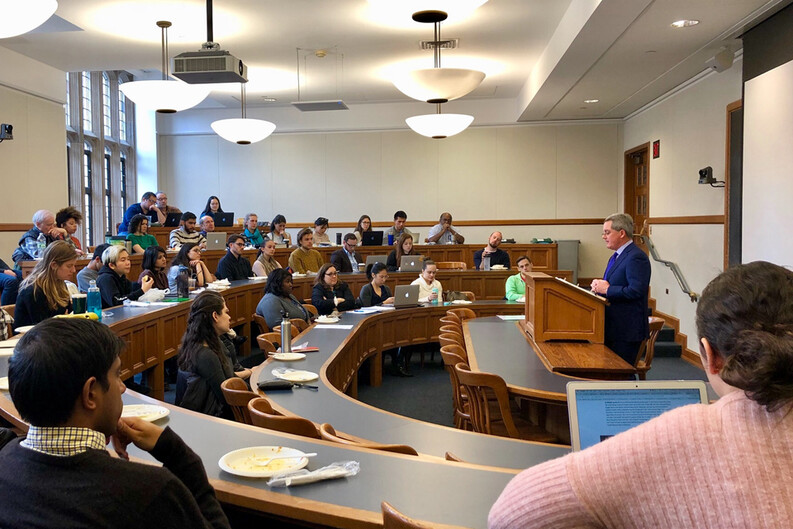SF City Attorney Discusses Local Advocacy with National Impact

On March 20, 2018, the San Francisco Affirmative Litigation Project (SFALP), American Constitution Society at Yale Law School, and Yale Law School Democrats hosted San Francisco City Attorney Dennis Herrera. In a talk titled, “San Francisco v. Trump: How To Take on the President and Win,” Herrera discussed how his office—in partnership with students in the SFALP clinic—wields progressive federalism principles both to uphold civil liberties and also to resist against federal actions that threaten local values.
Addressing a roomful of Yale Law students, Herrera shared that the San Francisco City Attorney’s Office has specifically partnered with Yale to pursue affirmative litigation in the public interest because “out of all schools, it’s Yale that shares the same level of commitment to the advocacy we do. The SFALP partnership has not only made good law—it’s produced real benefits for real people.”
Herrera remarked that a groundswell of resistance has risen against a federal administration rolling back protections for our most vulnerable communities. This resistance, Herrera observed, has many fronts. In politics, individuals never previously involved in campaigns—especially women—are running for office. Students are taking to the streets and the halls of power. “But the legal front is perhaps the most pivotal,” said Herrera. “It is in the courts that the federal administration’s xenophobic—and worst—policies have been halted.”
Under Herrera’s leadership, San Francisco is continually on the front lines of protecting local values from predatory corporations or federal overreach. In so doing, San Francisco embraces the principles behind New Federalism. The City Attorney’s Office filed the first-ever government lawsuit to challenge the constitutionality of California marriage laws that discriminated against same-sex couples. This movement to marriage equality from state and local governments such as San Francisco, Herrera said, laid the groundwork for future action. More recently, in response to President Trump’s January 2017 executive order threatening to strip federal funding from sanctuary jurisdictions, San Francisco responded swiftly. The city brought the first lawsuit in the nation to fight the order, which a federal judge permanently enjoined last November.
Herrera stated that his office vigorously pursues this kind of affirmative litigation “because we can and we should. When the federal government is not doing its job, it comes to state and local governments to stand up and fight the fight.”
“We’re confident in who we are, and in standing up for our values,” Herrera said. “We’re going to help the arc of history bend toward justice. The ‘Resistance’ is honorable, unrelenting, and not bound by geography.”
The first Latino ever elected as San Francisco City Attorney, Dennis Herrera leads an office that has spearheaded cases of national importance on civil rights, affordable healthcare, and environmental protection while remaining a tough and effective advocate for San Francisco’s neighborhoods, working families, and the underprivileged. Herrera has consistently taken an activist approach to his City Attorney’s role: not only serving city government clients but also using the power of law to make a difference in the lives of the people his office serves.
SFALP is a partnership between Yale Law School and the San Francisco City Attorney’s Office. SFALP students work with San Francisco Deputy City Attorneys to conceive, develop, and litigate some of the most innovative public-interest lawsuits in the country—lawsuits that tackle problems with local dimensions but national effects. SFALP has worked on a wide variety of issues, including consumer protection, nuisance abatement, wage theft, discrimination on the basis of sexual orientation, reproductive rights, Internet privacy, healthcare, housing, environmental protection, fairness in arbitration, childhood health and nutrition, payday lending, and access to legal services for immigrants.


